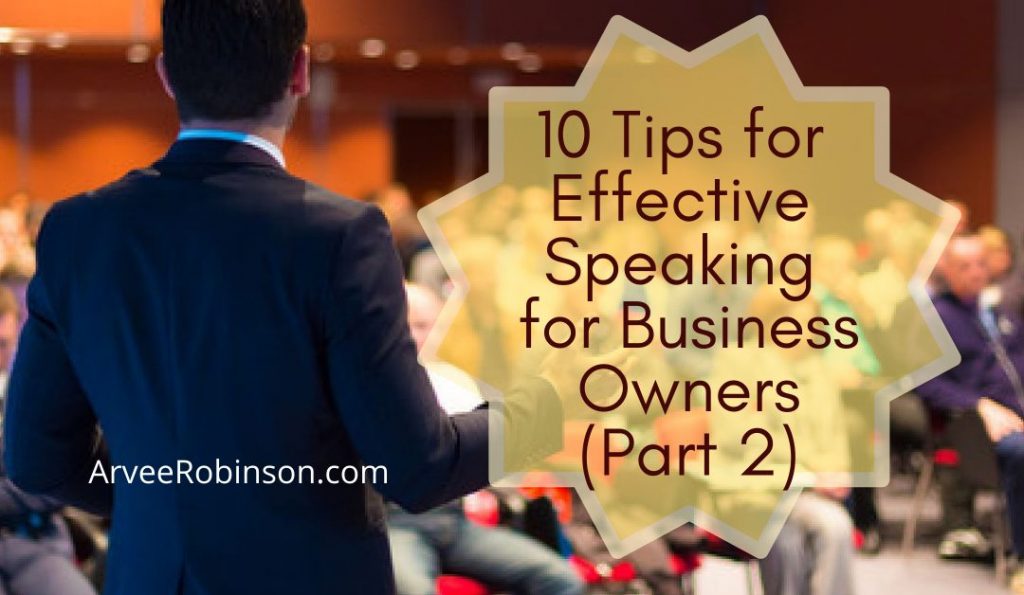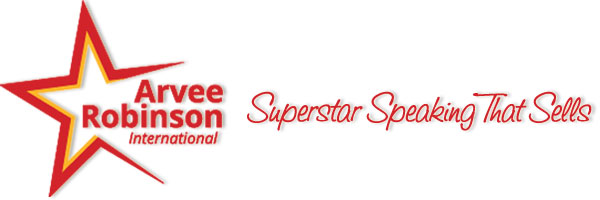
In the previous blog I shared the first 5 of the 10 effective speaking tips every business owner and entrepreneur needs to know before they speak. Here are the tips 6 through 10.
6. Learn the Art of Persuasion and Influence.
In a nutshell, find out what your audience wants and give it to them. That is the art of persuasion. Many speakers try to sell people on what they, the speaker wants and not what the audience wants. I hear this all the time, even when I am doing business with someone and I am interested in their product, yet they’re busy trying to sell me something else. I lose interest and they lose a sell. To establish credibility and influence, you must sell your prospect what they want first. Later, you can talk about all the other wonderful products and services you offer. The art of persuasion and influence is about finding out what your audience wants and serving them.
7. Deliver Great Content
Speaking of serving, always deliver great content. When I say great, I’m talking about the latest of the latest. Don’t simply talk about stuff that you’ve always been sharing. Your signature talk is fine, but make sure you regularly freshen up the content and share the latest and greatest content in your industry. Over deliver your content without overwhelming your audience. Yes, it’s possible to overdeliver without overwhelming, I discuss this in this blog post.
At this point, you might be wondering how much content should I deliver? Here are some guidelines for a 30-minute talk. You can give anywhere from 3 to 5 teaching points. Don’t try to give a gazillion points because you don’t have time to go deep. Strive to deliver great content, the latest content, and the right amount of content. Your audience will appreciate it.
8. Add Stories
Effective business speakers add stories in every speech. All great speakers are great storytellers. Why? Because they know that storytelling acts like invisible selling.
This is what I call, story-selling. Let the story, do the selling for you. There are four stories that you need to have in every speech.
They are:
- Professional story
- Story with a lesson
- Success stories
- Emotional stories
Bottom line, make sure you become a great storyteller.
9. The Invitation
The invitation is very important. This is the invitation to do business with you. Ultimately your invitation leads your audience to get access to more of your products and services. The invitation is about offering them the transformation that leads to the permanent change they desire. In other words, you offer a way to get the solution to their problem and eliminate their pain and suffering. Whatever it is that you are teaching, you always want your audience to have a way to get more.
I see so many business speakers say, “Thank you very much,” at the end of their speech and leave the audience without any offer to help them. Many business speakers use the invitation to say, “go to my website.” Nobody is going to go to your website without a compelling reason! Instead, tell them they can get something (specific) for free or to get more of you if they go to your website. Otherwise, they simply will not go on their own. Best not to make that your sole invitation. Instead, invite them to come and talk to you after the meeting if it is a live event. If it is an online event, encourage them to sign up for a free gift, or give your link to a free strategy session. Guide them to take action. When they do, they’re in your database where you can follow up and market to them slowly to get them into a product or service.
10. Practice Creates Confidence
Practicing your talk may seem obvious. However, I want to stress that you need to practice, practice, and practice your speech some more. I can’t say this enough. If you’ve listened to some of my other podcasts or read some of my other blogs, you will know my secret sauce is to practice, practice, practice, and then practice some more. You need to practice 1 hour for every 2 minutes of speech. If you have a 30-minute presentation, that means you need to practice for 15 hours. That’s how you get good. That’s how you become so confident that other people want you to speak on their stage. And, of course, your clients and customers want to do business with you because they see how confident you are. Not only will you become masterful at speaking, you will become masterful at delivering your products and services.
So there you have it in two blogs and a podcast. 10 tips for effective business speaking for entrepreneurs, business owners, coaches, and consultants. For more tips on virtual speaking for business owners watch this:
